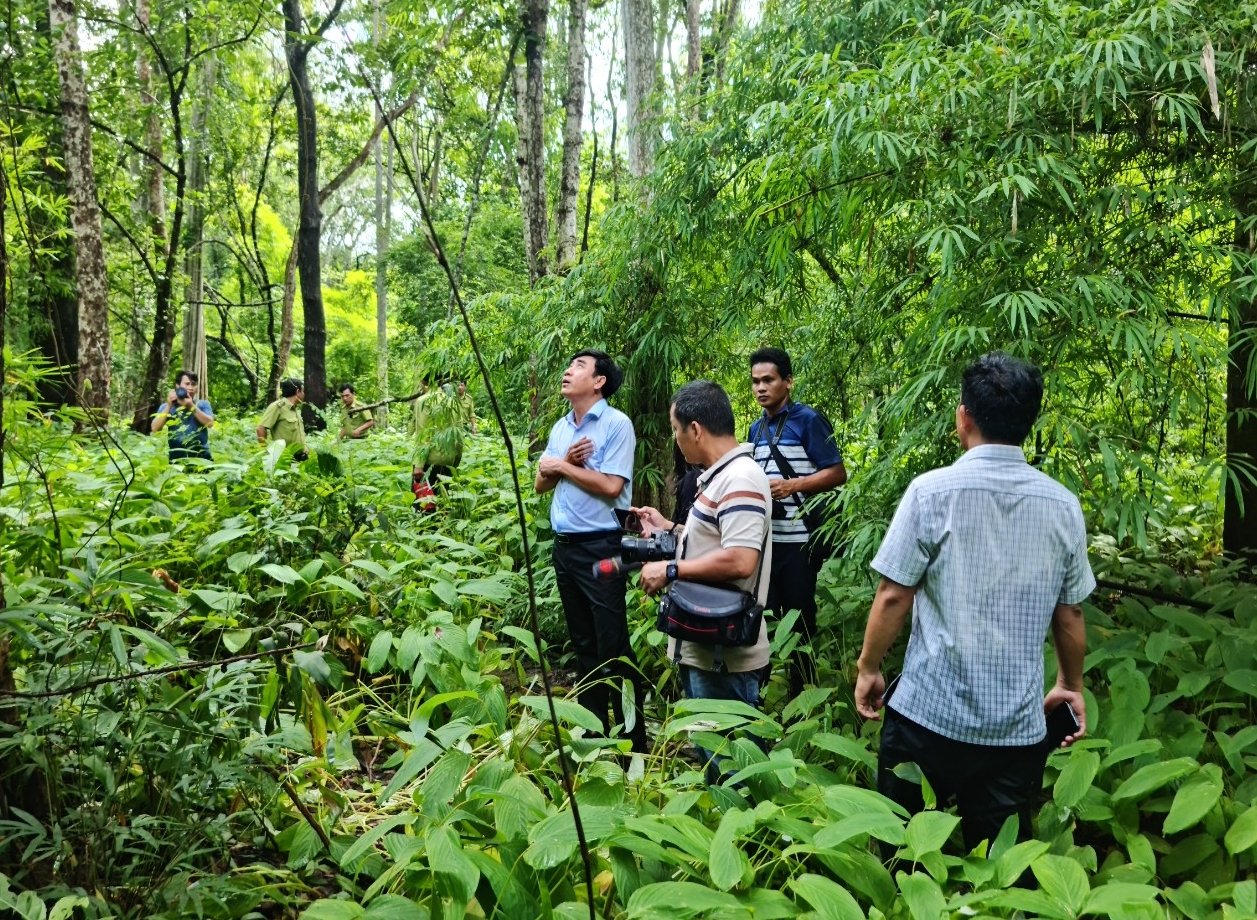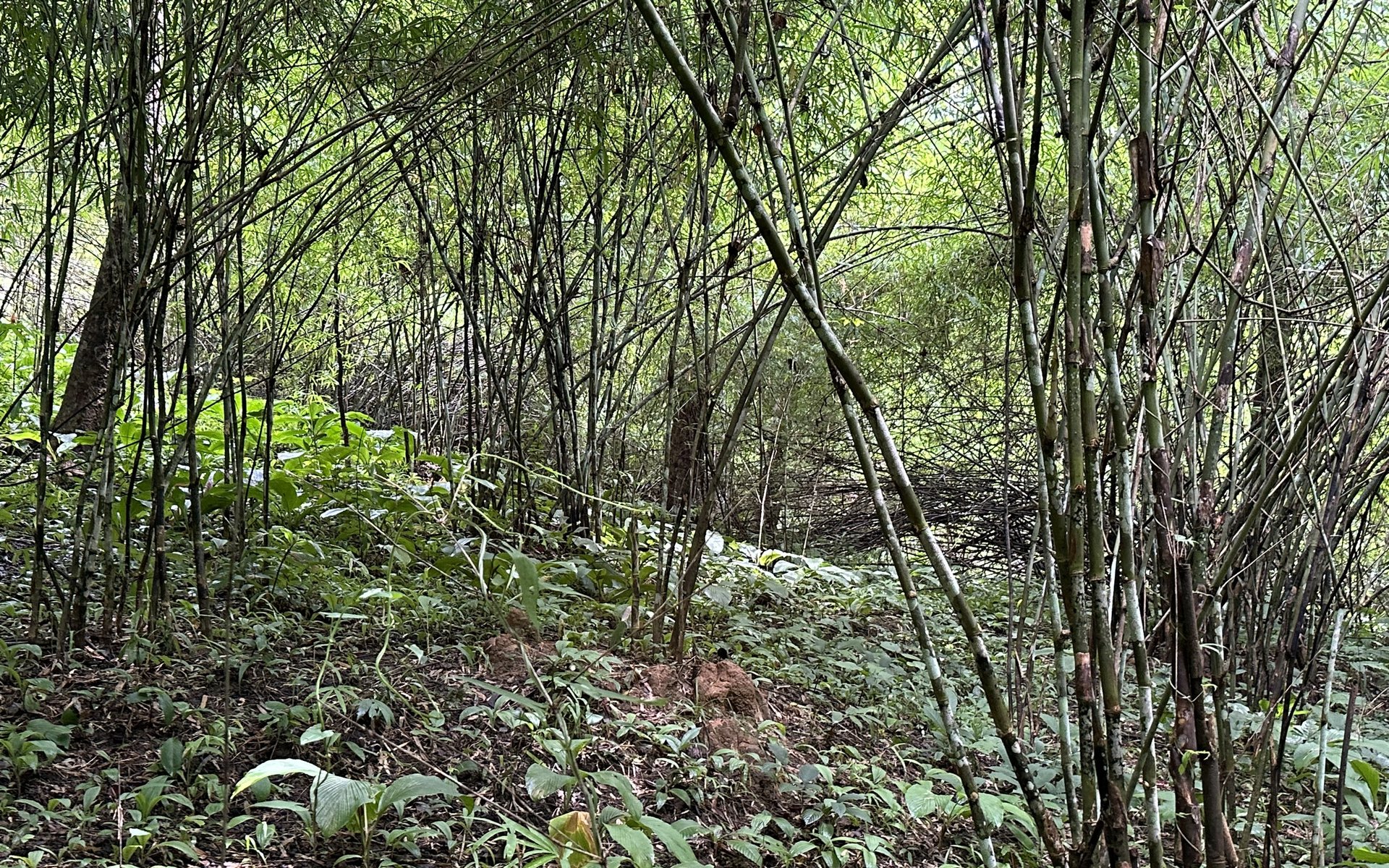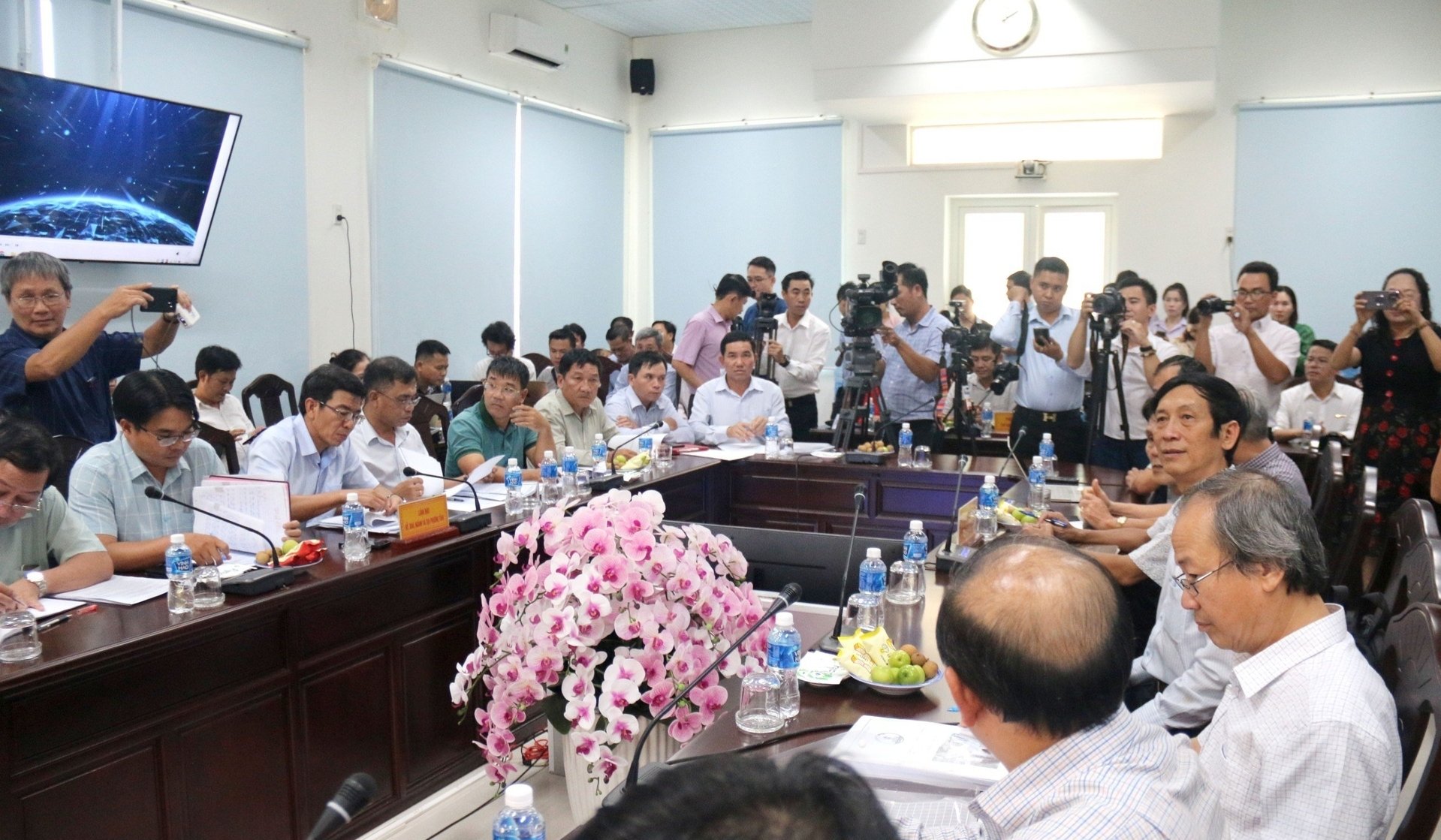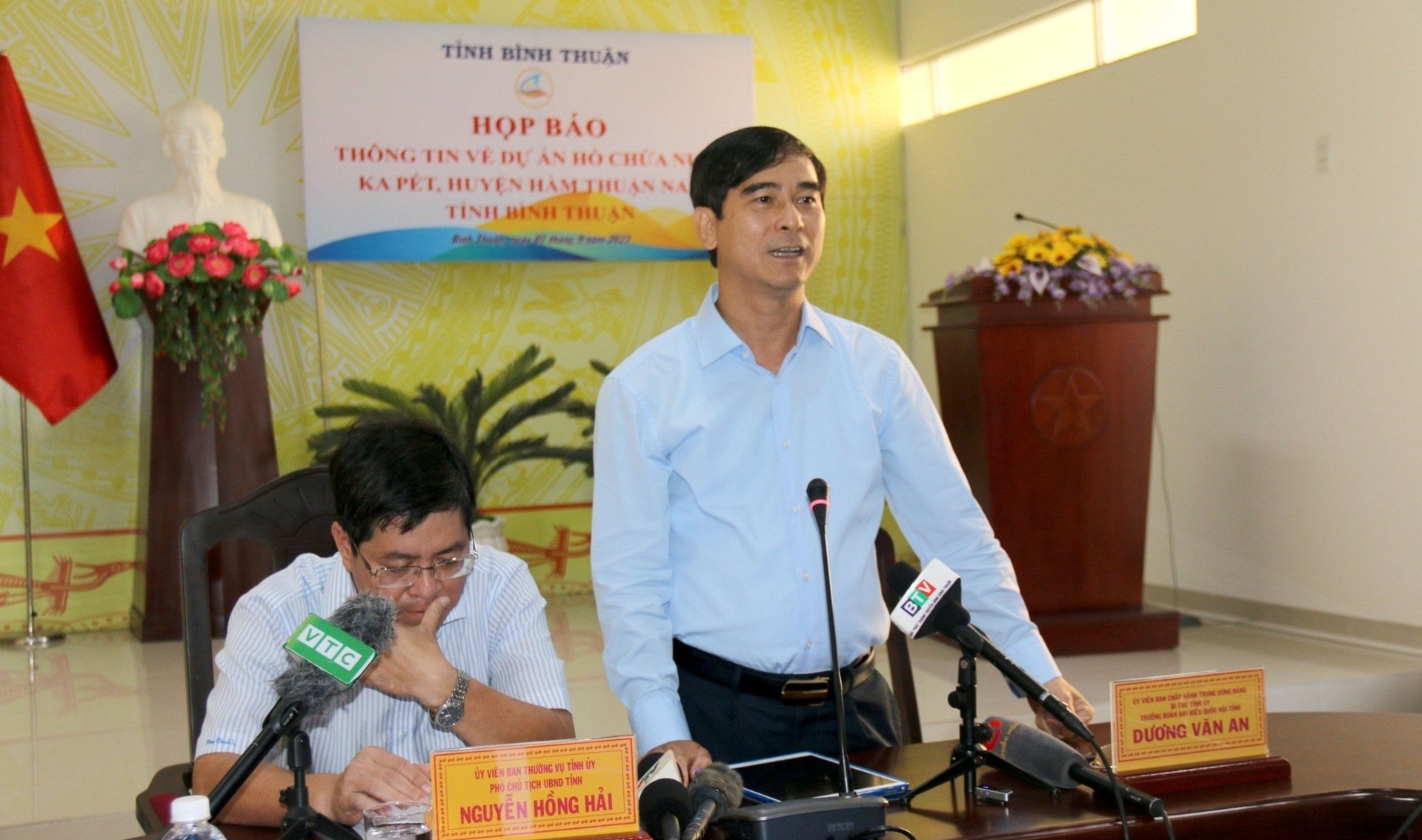June 17, 2025 | 20:24 GMT +7
June 17, 2025 | 20:24 GMT +7
Hotline: 0913.378.918
June 17, 2025 | 20:24 GMT +7
Hotline: 0913.378.918
In response to recent public interest in the conversion of more than 600 hectares of forest for the Ka Pet reservoir project in Ham Thuan Nam district, the provincial People's Committee of Binh Thuan Province conducted a press conference on September 7 to provide information about the project.

Binh Thuan Department of Agriculture and Rural Development has established an inspection team and confirmed that all rare forest areas are outside the Ka Pet reservoir project. Photo: TS.
Mr. Le Thanh Son, Deputy Director of the Binh Thuan Department of Agriculture and Rural Development, stated that the Ka Pet reservoir project was thoroughly analyzed and reported by experts and scientists at a number of state-level meetings and appraisal councils, as well as by a number of inspection teams from central agencies.
The Department of Agriculture and Rural Development has established an inspection team and affirmed that all of the ancient, valuable, and large-sized trees are located outside of the project area, in response to rumors that have been circulating on social media networks in recent days. Concerning the issue of timber exploitation, the Deputy Director of the Binh Thuan Department of Agriculture and Rural Development stated that after the competent authority approves the investment project, the environmental impact assessment, and completes the procedure for changing the forest use purpose, functional branches will be permitted to make forest exploitation plans.
After the approval of the exploitation plan, the competent authority will create an auction plan. The winning investors will contribute funds to the budget and exploit forest products. The project's exploitation of forest products will be closely monitored and plainly delineated by the monitoring unit.

Most of the forests in the project are bamboo and mixed trees. Photo: TS.
In accordance with Article 21 of the Forestry Law, a total of 1,844 hectares must be replanted with replacement forests in order to implement this initiative. The provincial People's Committee of Binh Thuan issued Decision 3263 on December 30, 2020, authorizing the first phase of a replacement afforestation plan covering 434 ha, of which 144 ha are natural forest.
For the remaining area of 1,410 hectares that must be planted with replacement forests, the Provincial Department of Agriculture and Rural Development is evaluating the expansion of additional planting locations for replacement forests in order to ensure the replacement forest planting area of the project.
Binh Thuan is one of the poorest regions in the country, with annual precipitation ranging from 800 to 1,150 mm. The drought has caused large tracts of land to lie dormant, making agriculture difficult and inefficient. In this province, there is not only a lack of production water, but also a lack of domestic water, which has a significant impact on people's livelihoods.

A large number of press agencies attended the press conference about the Ka Pet reservoir project. Photo: NT.
Binh Thuan province has endeavored for many years to construct an irrigation system (including reservoirs, weirs, pumping stations, and water inlet channels) with a total design capacity of over 362 liters. million m3. However, the demand for domestic and production water is expected to surpass 1,169 million m3/year by 2030, whereas the total design capacity of the reservoirs listed above can only meet 30% of this demand.
Mr. Duong Van An, Secretary of the Provincial Party Committee of Binh Thuan, stated that Binh Thuan requires more than 500 million m3 of water annually for agricultural production. Therefore, the province is responsible for the people's water supply. Over the past several terms, the province has utilized both Central Government and local resources in an effort to construct a system of water reservoirs and irrigation canals throughout the province.
Despite the fact that Binh Thuan's topography necessitates an irrigation reservoir, the reservoir has an impact on the forest. With a reservoir, however, the environment will undoubtedly improve, as it will collect water and increase the area's humidity, thereby fostering plant growth.

Mr. Duong Van An, Secretary of Binh Thuan Provincial Party Committee, said that the construction of Ka Pet reservoir will contribute to ensuring water security and improving people's lives. Photo: NT.
The consulting unit meticulously selected the location of 600 hectares of forest to construct an irrigation reservoir based on available natural conditions. In addition to analyzing numerous alternatives, the province has determined that the optimal capacity for irrigation and water basin requirements is 51 million cubic meters. The construction of the Ka Pet reservoir will contribute to the security of water sources and the improvement of human life.
It is common knowledge that the Ka Pet reservoir project is a significant national initiative approved by the National Assembly, which also determined to amend and supplement investment policies in Resolution No. 93 dated November 26, 2020, and Resolution No. 101 dated June 24, 2023.
The Ka Pet reservoir has a design capacity of over 51 million cubic meters and a total investment of over 874 billion Vietnamese Dong, of which the central budget is nearly 520 billion VND and the local budget is over 354 billion VND. The duration of project implementation is from 2019 to 2025.
When the project is finished and operational, it will provide irrigation water for approximately 7,762 hectares of agricultural land in the district of Ham Thuan Nam; Raw water supply for Ham Kiem II industrial park: 2.63 million cubic meters per year; producing a source of raw water for approximately 120,000 persons in the Ham Thuan Nam district and Phan Thiet city.
Simultaneously, prevent and control floods and improve the environment, regulate water for the downstream areas of Ham Thuan Nam district and Binh Thuan province; increasing flow in the dry season, contributing to the improvement of the ecological environment in the downstream area, particularly the section through Phan Thiet City, and contributing to the growth of tourism and services in Binh Thuan province.
The initiative encompasses a total land area of approximately 698 hectares, including approximately 680 hectares of forest land and more than 18 hectares of agricultural land. More than 619 hectares of the nearly 680 hectares of forestry land contain forests, including nearly 138 hectares of special-use forests, protection forests (0.51 hectares), production forests (440 hectares), land outside the planning of 3 types of forests (nearly 41 hectares), and non-forest land (over 60 hectares).
Translated by Linh Linh
![Turning wind and rain into action: [6] ‘Four on-the-spot’ disaster management software](https://t.ex-cdn.com/nongnghiepmoitruong.vn/608w/files/news/2025/06/17/e5a48259d6a262fc3bb3-nongnghiep-183800.jpg)
(VAN) By simply activating the scenario on the disaster management software, the relevant authorities immediately know how many households need to be evacuated, where to evacuate them to, and by what means of transportation…

(VAN) According to the Binh Thuan Department of Industry and Trade, in the first five months of 2025, Binh Thuan's dragon fruit export turnover increased by 20.65% compared to the same period last year.

(VAN) EU countries on Thursday gave final approval to new tariffs on fertilizer imports from Russia, a move aimed at cutting off revenue that could support Moscow’s war in Ukraine, despite concerns from European farmers.

(VAN) The working delegation from the Ministry of Agriculture and Environment conducted an important trip to the Netherlands to strengthen strategic partnerships and sustainable development in the agricultural sector.

(VAN) The letter ‘A Plea from the Ocean’ not only evokes emotion but also awakens the human conscience to the responsibility of protecting life on Earth.

(VAN) The Department of Agriculture in South Africa has announced the country’s first mass vaccination of poultry to prevent local birds from contracting avian influenza.

(VAN) Establishment of the Mekong Delta Regional Agricultural Linkage Center, aiming for a closed value chain, deep processing, trading platforms, and international market connectivity.